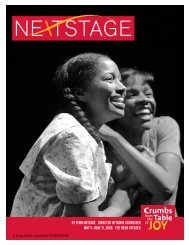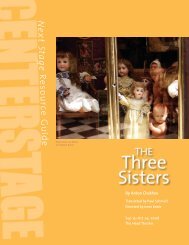Joe turner's Come and Gone - Center Stage
Joe turner's Come and Gone - Center Stage
Joe turner's Come and Gone - Center Stage
Create successful ePaper yourself
Turn your PDF publications into a flip-book with our unique Google optimized e-Paper software.
detached transients just up from the South. The traumas<br />
of slavery, dislocation, <strong>and</strong> migration wreak havoc on this<br />
errant population. For them, this welcoming business<br />
establishment signals much more than a temporary<br />
shelter. The Hollys’ residential business becomes an oasis<br />
that allows them to heal while gaining sustenance <strong>and</strong><br />
directions before resuming their separate journeys.<br />
<strong>Joe</strong> Turner’s <strong>Come</strong> <strong>and</strong> <strong>Gone</strong> typifies the debt that Wilson’s<br />
characters have to pay for their irreverent decisions to<br />
ab<strong>and</strong>on the agrarian South in favor of the North’s concrete<br />
jungle. Throughout his entire cycle of plays, Wilson is<br />
consistent in revealing the apocalyptic <strong>and</strong> tragic results<br />
of what he deems African Americans’ Original Sin. On rare<br />
occasions, his “marked” characters are able to avoid the<br />
inevitable doom of their mistake. A few are able to regain<br />
their footing <strong>and</strong> find their songs in time to get on with<br />
their lives. Unfortunately, such characters seem to be the<br />
exception rather than the norm. Southern migrants in<br />
August Wilson’s ten plays, as a rule, either perish in the<br />
North or become part of its human refuse.•<br />
1<br />
“August Wilson.” A World of Ideas: Conversations with<br />
Thoughtful Men <strong>and</strong> Women, pp. 167-80.<br />
2<br />
August Wilson, “The Play,” <strong>Joe</strong> Turner’s <strong>Come</strong> <strong>and</strong> <strong>Gone</strong>.<br />
Suggestions for Further Reading<br />
Pittsburgh’s Hill District (location of<br />
the Holly boarding house), ca. 1910.<br />
J. Trent Alex<strong>and</strong>er. “The Great Migration in Comparative<br />
Perspective: Interpreting the Urban Origins of Southern Black<br />
Migrants to Depression-Era Pittsburgh.” Social Science History<br />
22.3 (Autumn 1998): 349-76.<br />
Carole Marks. Farewell—We’re Good <strong>and</strong> <strong>Gone</strong>: The Great<br />
Black Migration. Bloomington: Indiana UP, 1989.<br />
S<strong>and</strong>ra Shannon. “A Transplant that Did Not Take: August<br />
Wilson’s Views on the Great Migration.” African American<br />
Review 31.4 (Winter 1997): 659-66.<br />
Hot Biscuits<br />
<strong>and</strong> Coffee:<br />
Bertha Holly<br />
as Cultural Worker<br />
by Dr. Psyche Williams-Forson,<br />
University of Maryl<strong>and</strong>, College Park<br />
Excerpted from “Selling More than Biscuits <strong>and</strong> Hot Coffee:<br />
Performing Gender <strong>and</strong> Food in August Wilson’s<br />
<strong>Joe</strong> Turner’s <strong>Come</strong> <strong>and</strong> <strong>Gone</strong>”<br />
In <strong>Joe</strong> Turner’s <strong>Come</strong> <strong>and</strong> <strong>Gone</strong>, new migrants to<br />
Pittsburgh find their way to the Holly boarding house.<br />
There they are greeted by Seth Holly’s declaration that<br />
room <strong>and</strong> board is $2 a week. They are also greeted<br />
with the gracious hospitality of his wife, Bertha. Boarders<br />
or visitors, guests can be sure that she will offer a cup of<br />
coffee <strong>and</strong> a biscuit. She nurtures her tenants <strong>and</strong> seems<br />
genuinely concerned with their well-being. But more than<br />
a caretaker, Bertha is also a cultural worker. As historian<br />
Bernice Johnson Reagon has observed,<br />
Women were the heads of their communities, the keepers<br />
of tradition. The lives of these women were defined by<br />
their culture, the needs of their communities, <strong>and</strong> the<br />
people they served[;] they accepted the responsibility<br />
when the opportunity was offered—when they were<br />
chosen. There is the element of transformation in all of<br />
their work…. These women, however, became central to<br />
evolving the structure for resolving areas of conflict <strong>and</strong><br />
maintaining, sometimes creating, an identity that was<br />
independent of a society organized to exploit natural<br />
resources, people, <strong>and</strong> l<strong>and</strong>. 1<br />
Often overlooked by critics is the importance of Bertha’s<br />
work. Yet in the opening scene of <strong>Joe</strong> Turner, as in most of<br />
the subsequent scenes, Bertha is busy helping her guests<br />
to break their morning fast. More than providing a piece of<br />
bread <strong>and</strong> a cup of drink, Bertha is assisting in the transition<br />
process of new arrivals from the South.<br />
During the periods following slavery, large numbers of<br />
Blacks migrated North, bringing their Southern mores.<br />
Unable to find or afford their accustomed dietary staples,<br />
migrants turned to their fellow African Americans or<br />
enlisted the assistance of mutual aid societies to help them<br />
adapt. Bertha consistently offers her Northern hospitality<br />
in the form of food: some “good biscuits,” along with gravy,<br />
grits, <strong>and</strong> fried chicken—all foods associated with the<br />
Next <strong>Stage</strong>: <strong>Joe</strong> Turner’s <strong>Come</strong> <strong>and</strong> <strong>Gone</strong> | 11









